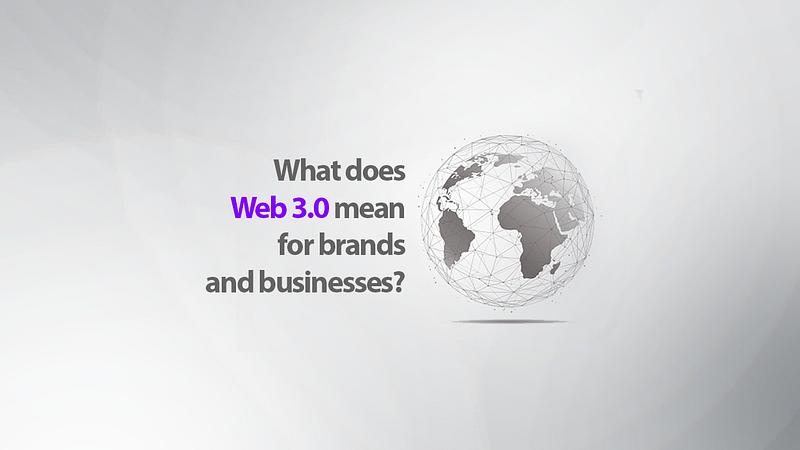What does Web 3.0 mean for Brands and Businesses?

The internet changed the way companies do business. Since 2014, Coca-Cola has spent an average of $4 billion a year on advertising globally. Almost enough to buy a Bored Ape NFT. Red Bull spends millions sponsoring people jumping out of planes. While not everyone can afford glitzy adverts in Times Square, web 2.0’s read and write websites have made it so everyone can reach out to their customers and interact with them. The internet has been amazing for building brand identity; whether for multinational corporations or your local bakery.
Three cornerstones of the web 3.0 internet are decentralization, censorship resistance, and privacy. So now that web 3.0 is around the corner, it carries some serious implications for brands and businesses. In this article, we will discuss some of these implications in more detail.
DIRECT TRANSACTIONS
Web 3.0 will enable seamless cross-border transactions. For example, several countries in Latin America have seen hyperinflation and their currencies devalued drastically. A lot of people from these countries who live abroad are sending money back home using cryptocurrency, including various stablecoins.
These direct transactions don’t require a third party and allow users to cut centralized figures such as banks, whose transaction fees often take a significant slice out of your cake. On the one hand, it might make it harder for companies that specialize in payment services, since users making cross-border payments might not go through them anymore, but on the other hand, it’ll open up borders, eventually allowing businesses to target underbanked customers in new developing regions directly.
It will force businesses that work as platforms and enablers, such as Upwork to rethink their business models and adapt. This will allow users to avoid high transaction costs and use smart contracts to make these transactions happen without convoluted banking processes.
DIGITAL OWNERSHIP
Blockchains allow for immutable transactions and ownership of a particular item, with NFTs being built around the same concept. This has made it possible so that every time an NFT is sold to a new owner, some proceeds of the funds go to the original creator. This could significantly impact content ownership on the internet, something companies have struggled with.
A great example of this is YouTube. For years, the platform has struggled with DMCA (Digital Millennium Copyright Act) takedown notices against its users. Just this week, Bungie, the video game company now owned by Sony slammed YouTube for its terrible copyright system.
Multiple DMCA takedown notices were filed against YouTubers who created content related to Destiny 2, a popular Bungie game. But those copyright notices were never filed by Bungie, the owner of the game. Imagine creating a song, publishing it to YouTube, and then someone on the other side of the planet just claiming the rights to it and walling you off.
Blockchains could make it easier for artists and photographers to lease out their work, and smart contracts could allow faster financial transactions. The latter could go on to help corporations provide financial services in countries with the extremely low credit to GDP ratios.
ADVERTISING & PRIVACY
The next issue is advertising. Companies today know everything about you, and can target you with specific adverts based on that knowledge. Companies track you across both the web and the real world, and most people can’t do much about it. Using an incognito tab on your phone is like firing a Nerf gun at an oncoming train.
Internet giants are able to capture an incredible variety of details through the way you interact with various applications on your phone. With the introduction of web 3.0 however, users will be able to have a lot more control over their data and who gets it.
Point Network, for example, is considering storing client data on the client-side itself, instead of a centralized repository, so that client’s browsers will be able to pull appropriate ads instead of a company getting the user data, decentralizing Facebook’s trillion-dollar business model.
DATA SECURITY
In 2021, the global average cost to a company for a data breach was $4.24 million. That’s a huge yearly increase from the $ 3.86 million in 2020. While some of that can be attributed to more remote teams collaborating from various private home networks, it’s clear that cyber attacks are getting more powerful. Blockchain is a lot more secure, and its decentralized systems of nodes instead of a centralized server also ensure it doesn’t have a single point of failure. This ensures businesses can better serve their customers and remain up and running, no matter what.
Point Network also allows users to have one username they log in to all Dapps with, which means no more endless confirmation mails and OTPs. Businesses will be able to seamlessly get users onto their platform with just a few clicks, instead of having users dropping out of their carefully constructed funnels so often.
Conclusion
The transition to a decentralized internet will take place faster than the transition to the traditional internet. With information so easily accessible to the majority of the global population, changes occur much quicker. From Kodak to Nokia, the annals of business are littered with firms that failed to adapt fast enough.
Disclaimer: This post is not financial advice
Find us at www.pointnetwork.io
Join our Telegram at: https://t.me/pointnetworkchat